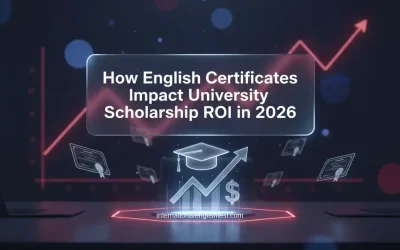The future continuous tense is a crucial aspect of English grammar that helps describe actions or events that will be ongoing at a specific time in the future. It allows us to project ourselves into the future and talk about what will be happening, making it essential for everyday conversation, business, and academic discussions.
In this article, we’ll explain the structure, usage, and examples of the future continuous tense to help you master it. We will also show you how to test and improve your English skills with the International English Test (IET), which offers certification for your proficiency level.
What is the Future Continuous Tense?
The future continuous tense is used to describe actions or events that will be happening at a specific moment in the future. This tense emphasizes the ongoing nature of the action, rather than its completion.
Structure of the Future Continuous Tense:
The future continuous tense is formed by combining the simple future of the verb “to be” (will be) with the present participle of the main verb (the base verb + ing).
The formula is:
Subject + will be + present participle
Examples:
- I will be staying at my friend’s house tomorrow.
- He will be watching the game when I arrive.
How to Form the Future Continuous Tense
Affirmative Form:
To form the affirmative in the future continuous, use the simple future of the verb “to be” (will be) + the present participle of the main verb.
Example:
- I will be staying with my cousin next weekend.
Negative Form:
To form the negative in the future continuous, add “not” after “will” (or use the contraction “won’t”).
Example:
- He won’t be staying at the hotel next time.
Interrogative Form:
To form the interrogative form, invert will and the subject.
Example:
- Will you be staying at the new hotel during your trip?
Negative Interrogative Form:
For the negative interrogative, combine “won’t” and the subject.
Example:
- Won’t they be staying at the beach house?
Example: To Stay in the Future Continuous Tense
| Affirmative | Negative | Interrogative | Negative Interrogative |
|---|---|---|---|
| I will be staying. | I won’t be staying. | Will I be staying? | Won’t I be staying? |
| You will be staying. | You won’t be staying. | Will you be staying? | Won’t you be staying? |
| He will be staying. | He won’t be staying. | Will he be staying? | Won’t he be staying? |
| She will be staying. | She won’t be staying. | Will she be staying? | Won’t she be staying? |
| We will be staying. | We won’t be staying. | Will we be staying? | Won’t we be staying? |
| They will be staying. | They won’t be staying. | Will they be staying? | Won’t they be staying? |
Functions of the Future Continuous Tense
The future continuous tense has various applications in English. Let’s explore some of the main functions:
1. Projecting into the Future
This tense allows us to imagine ourselves in the future, performing actions that will be in progress.
- Example: This time next week, I will be sunbathing in Bali.
- Example: By Christmas, I will be skiing like a pro.
2. Predicting or Guessing about the Future
The future continuous can be used to predict or make educated guesses about what will happen.
- Example: He’ll be coming to the meeting, I expect.
- Example: I guess you’ll be feeling thirsty after working in the sun.
3. Asking Politely about the Future
In the interrogative form, this tense can be used to ask polite questions about future events.
- Example: Will you be bringing your friend to the pub tonight?
- Example: Will Jim be coming with us?
4. Continuous Future Events
It refers to events that are expected to be continuous and ongoing in the future.
- Example: I’ll be seeing Jim at the conference next week.
- Example: When he is in Australia, he will be staying with friends.
5. Using “Still” to Refer to Ongoing Future Actions
When combined with “still,” the future continuous tense is used to describe actions that will continue in the future.
- Example: In an hour, I’ll still be ironing my clothes.
- Example: Tomorrow, he’ll still be suffering from his cold.
6. Talking About the Future in a Casual Manner
It is commonly used in everyday speech to talk about plans or arrangements in the near future.
- Example: Next year, will she still be wearing a size six?
- Example: Won’t stock prices still be falling in the morning?
Test Your English with the International English Test (IET)
If you’re looking to improve your understanding of English grammar, including the future continuous tense, the International English Test (IET) is an excellent way to assess your proficiency. The IET evaluates your grammar, vocabulary, reading, writing, and listening skills, offering you a comprehensive understanding of your English level, from A1 to C2.
By taking the IET, you can receive a globally recognized certificate that showcases your English ability. Whether you’re a student preparing for exams, a professional looking to enhance your resume, or simply seeking to improve your English skills, the IET is an ideal tool for achieving your goals.
Conclusion
Mastering the future continuous tense will enhance your ability to discuss plans, predictions, and ongoing future events. Whether you’re making guesses about what will happen or discussing arrangements, this tense plays a vital role in expressing yourself in English. To solidify your skills and gain an official certificate, consider taking the International English Test (IET), which will help you track your progress and improve your English proficiency.




